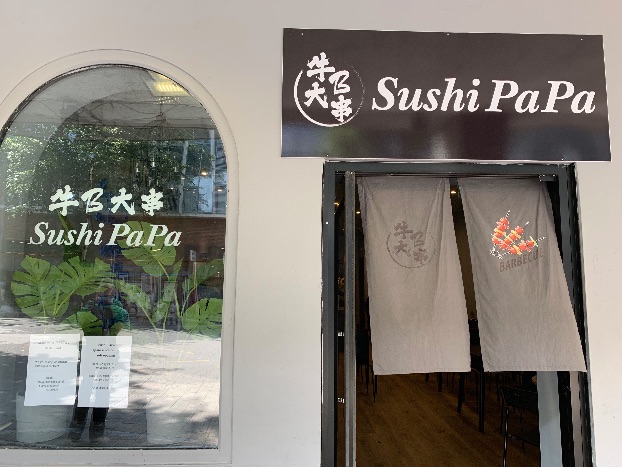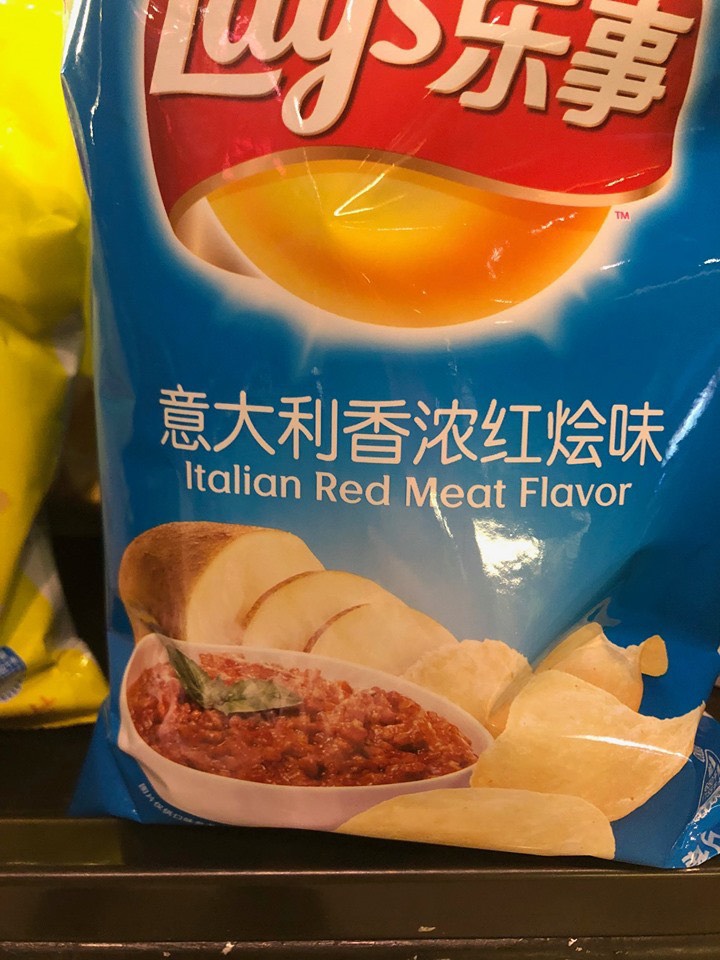Archive for Names
Awesome sushi barbecue restaurant
From Nora Castle, who came across this restaurant which has just opened in Coventry, England:
Read the rest of this entry »
Nicknames for foreign cars in China
"Porsche and BMW are known as 'broken shoes' and 'don’t touch me' in China", by Echo Huang
Many of these names are off-color and some even quite vulgar, but they are all affectionate:
Audi’s RS series: xīzhuāng bàotú 西装暴徒 (“a gangster in a suit”), inspired by the car’s smooth look and impressive horsepower (some links in Chinese).
Bugatti’s Veyron: féi lóng 肥龙 (“fat dragon”). The French car manufacturer’s high-performance Veyron sports car earned the moniker for its round-front face design, and because “ron” in Veyron sounds like “lóng" ("dragon"), just as "Vey" sounds like féi ("fat").
BMW: bié mō wǒ 别摸我 (“don’t touch / rub me”). The German acronym for Bayerische Motoren Werke forms the basis to create a Mandarin phrase that expresses how precious people consider the car to be.
Read the rest of this entry »
Mycological meandering: vernacular variora
The surname of the mayor of Prague is Hřib (Zdeněk Hřib [b. May 21, 1981]):
"Zdeněk Hřib: the Czech mayor who defied China"
By refusing to expel a Taiwanese diplomat, the Prague mayor has joined the ranks of local politicians confronting contentious national policies
The surname Hřib, though unusual, struck me as familiar. Jichang Lulu observes:
Hřib is the regular Czech reflex of the Proto-Slavic source of, e.g., the Russian and Polish words for "mushroom" (гриб, grzyb). The Czech form, however, has a more specific meaning (certain mushrooms, e.g., Boletus). On the other hand, the further origin of Slavic gribъ has long been a matter of much debate, and I'm not aware of a generally accepted Proto-Indo-European (or other) etymology.
That set me to wondering whether there are cognates in other IE branches.
Read the rest of this entry »
Uyghurstan or Uyghuristan?
Many countries in Central Asia are named with words that end in -stan, which is a Persian term (ـستان [-stān]) meaning "land" or "place of", thence "country"; it is synonymous and cognate with the Sanskrit word sthāna स्थान (from Indo-Iranian *stanam "place," literally "where one stands," from PIE *sta-no-, suffixed form of root *sta- "to stand, make or be firm." Source). Consequently, we refer to these countries as "the stans":
Afghanistan, Kazakhstan, Kyrgyzstan, Pakistan, Tajikistan, Turkmenistan, and Uzbekistan
Note, however, that five of these names have an -i- before the -stan, while two — Kazakhstan and Kyrgyzstan — lack the -i-.
Since the Uyghurs may one day have a country of their own with a name ending in -stan, I wondered whether there is a rule governing whether it should be "Uyghurstan" or "Uyghuristan".
Read the rest of this entry »
War on foreign names in China
AP News report (6/21/19) by Fu Ting: "Chinese crackdown on foreign names draws protest". The article begins thus:
The Manhattan neighborhood, Venice Garden, the Vienna hotel chain — to the ears of the Chinese government, the names are too foreign-sounding and must go.
Provinces and cities across China have been issuing notices pressuring both private and public officials to rename businesses, bridges and neighborhoods, reflecting renewed efforts by President Xi Jinping’s government to “sinicize” China.
Read the rest of this entry »
Double-barrelled surnames: ask Language Log
Eoin Cullen writes:
For a while I’ve been familiar with the fact that there is an established set of two-character surnames in Chinese including Sīmǎ 司馬 and Ōuyáng 歐陽, but I was interested to see the novel two-character surname of the head of the SAR government in HK, Lam4zeng6 Jyut6ngo4 林鄭月娥.
Read the rest of this entry »
Italian Red Meat Flavor potato chips
Jeff DeMarco writes:
My son in Hong Kong made this insightful quip regarding the attached photo: “I feel cooperation with China is ultimately going to depend on us understanding each other's potato-chip flavors.”
I presume the meaning is something along the line of “spaghetti sauce flavor….”
Read the rest of this entry »
Prakritic "Kroraina" and Old Sinitic reconstructions of "Loulan", part 2
What follows is Doug Adams' draft of an excursus that is not trying to be complete in itself (i.e., it's not a free-standing article), but rather something that will provide a certain amount of orientation to readers of the review of Schmidt's Nachlass (for which see the first item in the "Readings" below).
[Excursus: The Name of Lóulán/Kroraina: It is universally assumed (1) that Lóulán (the contemporary Chinese pronunciation of the relevant Chinese characters) and Niya-Prākrit Kroraina (Sogdian krwr’n) refer to the same place[1] and, further, (2) that they are, at bottom, the same word. In discussions of Lóulán/Kroraina, Lóulán is confidently given the earlier (Old/Middle?—the age is not usually noted) Chinese pronunciation of *γləulan or the like (Schmidt gives *γlaulan). Since Middle Chinese (ca. 600 AD) /l/ is known to reflect Old Chinese (ca. 1000-200 BC) /r/, it would seem to be a short hop to a reconstruction of *γrəuran in, say, 500 BC.
Read the rest of this entry »
Insect name
How would you respond in your native language if someone walked up to you and asked (in your native language or in English or some other language which both of you know), "What's the word for 'the insect that eats wood and destroys walls'?".
A friend of mine in China did that with eight of his colleagues, and not a single one of them could remember the Chinese name for "the insect that eats wood and destroys walls".
Read the rest of this entry »
Illegal dog names
This odd headline caught my eye:
"Man in China detained after giving dogs 'illegal' names," by Travis Fedschun | Fox News (5/15/19)
And what were the offending names? Not what you might have thought:
Chéngguǎn 城管 ("Urban Management")
Xiéguǎn 协管 ("Assistant Management")
Read the rest of this entry »
Prakritic "Kroraina" and Old Sinitic reconstructions of "Loulan"
Inquiry from Doug Adams:
As you know I’m working on a review for JIES [Journal of Indo-European Studies] on KT Schmidt’s Nachlass [VHM: see here]. I need to say something about the name Loulan itself and, not unusually, I’m sinking uncontrollably into the quicksand of reconstructed Chinese. The question arises concerning the first syllable, represented by Karlgren’s character 123b. The modern pronunciation is lóu. Because it is assumed to be the Chinese transcription of the first syllable of the native word Kroraina, one finds, in discussions of Loulan, reconstructions like *gləu or *γləu, with the (unstated) assumption that the *l stands for a yet earlier *r. But, when the name Loulan is not part of the discussion, i.e., in general reconstruction, the initial is just *l– or, earlier, *r– (Schuessler gives OCM *rô or roʔ [and Late Han (about the turn of the millennium) *lo or lioB]) The Khotanese word referring to Loulan/Kroraina is raurana– and is obviously the same word as the Chinese and, indeed, very probably a borrowing therefrom. So where does the *gl-/*γl– come from? Or is the Chinese Loulan not a transcription of Kroraina but merely an accidental (partial) look alike?
Any elucidation you can give would be appreciated.
Read the rest of this entry »
Why we say "Beizhing" and not "Beijing"
Well, I don't say "Beizhing", and I think it sounds ghastly, so much so that I cringe when I hear it and my flesh creeps. I never could figure out why English speakers would use this hideous pronunciation when it would be so much easier, transparent, and direct just to pronounce the name the way it looks: "bei-", like "bay", as in "Beirut" (we don't have any trouble with that, do we?), and "-jing" as in "jingle". BEI- -JING! Voilà! We don't have to say "bei- -zhing". I realize, though, that almost everybody, including many China specialists who surely know better, say "Beizhing", not "Beijing".
Finally, an anonymous curmudgeonly correspondent offers some reasons for how it came about:
Read the rest of this entry »

